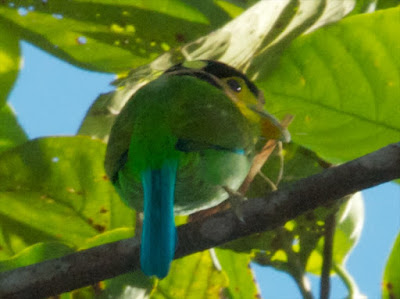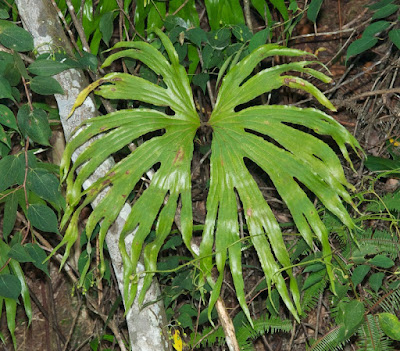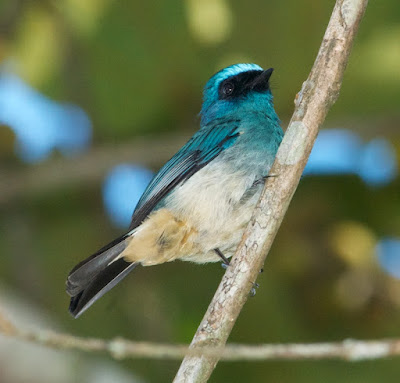Pages on this blog
▼
Saturday, September 26, 2015
Sabah: The Crocker Range
Mount Kinabalu is every birder's first choice for highland birding in Sabah, but there is another readily available possibility: the road running southeast from the coastal capital of Kota Kinabalu to Tambunan passes over a portion of the Crocker Range. Near its high point is the Rafflesia Information Centre, a jumping-off point for trails leading to growth sites for Rafflesia pricei.
On my very first trip to Borneo, back in 1992 with my good friend Barry Kent Mackay, those trails were the site our first foray into the field, down to see R. pricei's dinner-plate-sized flowers.
On the day after our trip to Mount Kinabalu (February 6, 2014), Hezekiah and I made a morning run back to the Rafflesia Centre - only to find it closed. Moreover, the local trees were not fruiting, which meant that my target bird here, Whitehead's Spiderhunter (Arachnothera juliae), was unlikely to be around (and indeed it wasn't). Nonetheless, we had a pleasant couple of hours birding along the roadside above the centre gate.
Middle elevations like those at the Rafflesia Centre are good places to look at wintering flycatchers from further north in Asia. The Mugimaki Flycatcher (Ficedula mugimaki) is probably the commonest of the lot.
The Blue-and-white Flycatcher (Cyanoptila cyanomelana) is a more attractive bird than this photo suggests, but this one was reluctant to come out of the shadows.
Insects were worth watching, too. One roadside tree held a colony of stingless bees (probably Tetrigona sp), the tube-shaped entrance to their nest almost invisible against the bark (but revealed by the comings and goings of its owners). Stingless bees of a number of species are widespread in Sabah, but one study suggests that they are particularly vulnerable to selective logging practices. Here, in the Rafflesia Reserve. this colony at least is relatively safe.
Butterflies included this unidentified skipper...
... and a Blue Admiral (Kaniska canace), the same species we had seen on Mount Kinabalu the previous day (but looking very different with its wings folded).
The Blue Admiral is pretty much confined to the highlands, but this Common Three-Ring (Ypthima pandocus) can turn up almost anywhere there are trees.
Unquestionably the ornithological highlight of the day was this scruffy and untidy mass of vegetation, high in a tree near the road edge. It is the nest of a Long-tailed Broadbill (Psarisomus dalhousiae), a fairly rare bird in Borneo.
The bird itself (or, I presume, a pair) flew back and forth over the road and perched on nearby branches, but though we waited for some time I was unable to get a photo of one at the nest (it didn't help that the nest entrance appeared to be on the opposite side from our vantage point).
As I mentioned, the Bornean race P. d. borneensis is a much less common bird than its equivalent on the Asian mainland, though it is apparently common in the Trus Madi area. We were lucky to see it (as I learned from the envious comments of some of my birding friends!).
There were always plants to admire and wonder about. Is this a Schefflera of some sort?
What sort of fern is this?
Is this an orchid?
What plant boasts these spectacularly long drip tips hanging from the end of its leaves?
This may not look it, but it is a fern: the umbrella fern Dipteris conjugata, member of an early fern family, Dipteridaceae, that ranges back to the Triassic and once spread across the world, but is now restricted to two Southeast Asian and Australasian genera.
Mussaenda frondosa we had already met on Mount Kinabalu, the day before.
Back at the Rafflesia Centre, we came across this White-throated Fantail (Rhipidura albicollis), the highand representative of the fantail family in Borneo.
Even more cooperative was this lovely little bird, an Indigo Flycatcher (Eumyias indigo), another highland specialist (it is also found in Java and Sumatra).
The Indigo Flycatcher is a common bird both here and on Mount Kinabalu, and is hard to resist when you come across it.
After our morning around the centre we headed down the road a bit for lunch (and a look at a Grey Wagtail (Motacilla cinerea) perched on the wires overhead). We had things to do in the afternoon - but late in the day we did have a chance to see some quite different birds, in an altogether different habitat. I'll tell you about that in my next post.































No comments:
Post a Comment